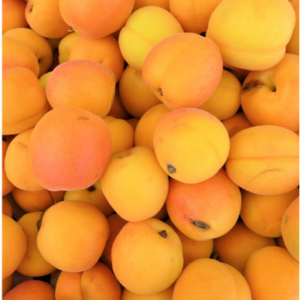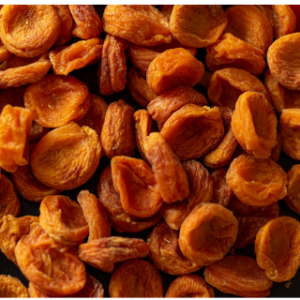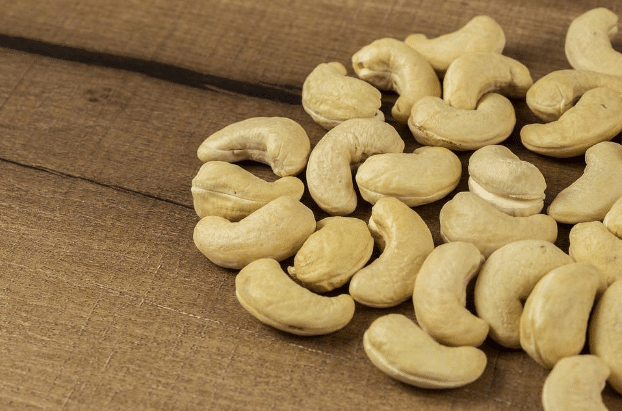About Apricots
- Apricots belong to the rose family which bears fruits. They are cultivated in temperate regions throughout the world, especially in the Mediterranean region. These are very closely related to almonds, peaches, cherries, and plums. Apricots are consumed fresh, cooked, or even preserved by drying and canning. Apricot trees are small and short but spread far.
- The leaves of the trees are bright green in color and have pointed tips, the leaves are erect on the twigs. Flowers of this fruit are the same in morphology to plum, cherry, and peach, the flowers are white in color and are solitary or single in leaf axils and appear to be in clusters, there are 5 petals in the flower which originate from the floral cup.
- Most of the trees self pollinate with the help of bees, bees are major pollinators of apricot flowers. The fruit is a drupe and has the texture of a suture. The fruit is yellow, orange with a hint of red blush in color. The fruit’s pit is mostly smooth, surrounding a seed, and the color of the flesh is mostly orange.
- The seeds of apricots are sweet but are poisonous until they are roasted.
Scientific Classification
- Kingdom – Plantae
- Class – Tracheophytes
- Class – Angiosperms
- Class – Eudicots
- Class – Rosids
- Order – Rosales
- Family – Rosaceae
- Genus – Prunus
- Subgenus – Prunus subg. Prunus
History and origin
- It originated and started spreading from northeastern China.
- It spread throughout central Asia, the cultivation of apricots dates back 3000 years ago in China.
- The Europeans were introduced to apricots by Romans in 70-60 BC in Greece and Italy.
- The English settlers and Spanish missionaries introduced apricots to the United States of America.
- For most of the history of apricot cultivation, apricots were cultivated and grown from seedlings and very few improved cultivars existed till the nineteenth century.
Cultivation and harvesting
- They need fertile, well-drained soils, and need to be dug deep in the soil.
- They are frost-sensitive and need Mediterranean climates to grow successfully.
- They are propagated by chip-budding onto rootstocks, apricot seedlings are most common and are easy to find for rootstocks.
- Trees are planted and placed in solid blocks and are kept at a distance of up to 20-24 feet. Every year all the grown and interfering woods and stems are cut down so that the spurs get maximum sunlight.
- On maturity, the apricot fruits are picked when firm by handpicking carefully. The firm fruit is the indicator of the maturity of fruits. The fruits are handpicked 2-3 times over the year.
Health benefits

- Apricots aid in weight loss- These fruits are a very good source of fiber which is very essential in the digestion of food, the fibers help in preventing diabetes, heart diseases, and weight gain.
- Apricots are high in antioxidants- Those are a very good source of antioxidants such as vitamin A, vitamin C, vitamin E, and beta carotene, these compounds fight the radicals which are responsible for damaging cells and increasing oxidative stress which further causes obesity and other diseases such as heart disease.
- Apricots improve vision – apricots are a great source of xanthophylls and carotenoids which are believed to prevent age-related vision problems.
- Apricots help in skin health – vitamin C and vitamin E which are found in apricot aid the skin, vitamin C protects the skin against UV damage and other pollutants.
- Apricots aid in diabetes treatment – They are very low in calories and carbs which is a very good thing for diabetes patients, the fiber in apricots regulates the blood sugar levels in the body.
- Apricots help in strengthening bones – It is a great source of calcium which is necessary for bone development.
- Apricots are good for the heart – These fruits are high in fiber content, which helps in reducing bad cholesterol in the body, and also increases the good cholesterol in the body. Contain potassium which balances the level of the electrolyte in the system thus keeping heart muscles healthy.
Internal links:
King of fruits: Dasheri Mangoes You should take it to get many medicinal benefits
Jatoba Fruit, What you know about it’s medicinal benefits? -Erakina
Do you know this durian fruit with divine taste and a horrible smell -Erakina
By Sanket Sawant
25/01/2022







Vitamin C rich food
Apricots are a relative of the peach.
I quite like reading an article that can make people think. Also, thanks for allowing me to comment! youubbe.me
Le courrier électronique n’est pas sûr et il peut y avoir des maillons faibles dans le processus d’envoi, de transmission et de réception des courriers électroniques. Si les failles sont exploitées, le compte peut être facilement piraté.
pin up casino https://azerbaijancuisine.com/# pin-up kazino
pin-up cazino
mexican pharmaceuticals online [url=http://northern-doctors.org/#]mexican pharmacy northern doctors[/url] mexican border pharmacies shipping to usa
mexico drug stores pharmacies [url=http://northern-doctors.org/#]mexican pharmacy online[/url] reputable mexican pharmacies online
mexican rx online [url=http://northern-doctors.org/#]mexican pharmacy online[/url] mexican mail order pharmacies
https://northern-doctors.org/# mexico drug stores pharmacies
http://northern-doctors.org/# mexican online pharmacies prescription drugs
pharmacies in mexico that ship to usa: northern doctors – mexican pharmacy
https://northern-doctors.org/# mexican mail order pharmacies
buying prescription drugs in mexico: northern doctors – buying prescription drugs in mexico
buying prescription drugs in mexico: mexican pharmacy – п»їbest mexican online pharmacies
https://northern-doctors.org/# mexico pharmacies prescription drugs
medicine in mexico pharmacies: mexican pharmacy online – mexico pharmacy
п»їbest mexican online pharmacies: Mexico pharmacy that ship to usa – mexican online pharmacies prescription drugs
https://northern-doctors.org/# pharmacies in mexico that ship to usa
pharmacies in mexico that ship to usa Mexico pharmacy that ship to usa reputable mexican pharmacies online
mexico drug stores pharmacies: mexican pharmacy online – mexican online pharmacies prescription drugs
mexican border pharmacies shipping to usa: northern doctors – mexican pharmaceuticals online
mexican pharmaceuticals online: mexican pharmacy northern doctors – mexican pharmacy
https://northern-doctors.org/# medication from mexico pharmacy
best online pharmacies in mexico: mexican pharmacy northern doctors – mexican rx online
https://northern-doctors.org/# mexican mail order pharmacies
mexican border pharmacies shipping to usa: mexican pharmacy northern doctors – medicine in mexico pharmacies
mexican mail order pharmacies mexican rx online buying from online mexican pharmacy
best online pharmacies in mexico: medication from mexico pharmacy – buying prescription drugs in mexico
https://northern-doctors.org/# medicine in mexico pharmacies
best online pharmacies in mexico: mexican pharmacy online – reputable mexican pharmacies online
mexican rx online: mexican pharmacy online – п»їbest mexican online pharmacies
https://northern-doctors.org/# mexican pharmaceuticals online
mexico pharmacy: Mexico pharmacy that ship to usa – reputable mexican pharmacies online
http://northern-doctors.org/# medicine in mexico pharmacies
buying prescription drugs in mexico: northern doctors – buying prescription drugs in mexico online
buying prescription drugs in mexico: mexico drug stores pharmacies – mexico drug stores pharmacies
mexico drug stores pharmacies mexican northern doctors mexican border pharmacies shipping to usa
http://northern-doctors.org/# medication from mexico pharmacy
mexico drug stores pharmacies: mexican pharmacy – mexican border pharmacies shipping to usa
https://northern-doctors.org/# п»їbest mexican online pharmacies
mexican border pharmacies shipping to usa: northern doctors – mexico pharmacy
reputable mexican pharmacies online online mexican pharmacy mexican pharmaceuticals online
https://cmqpharma.com/# purple pharmacy mexico price list
medication from mexico pharmacy
mexican rx online mexican pharmacy online reputable mexican pharmacies online
reputable mexican pharmacies online cmq pharma mexican pharmacy п»їbest mexican online pharmacies
п»їbest mexican online pharmacies mexican online pharmacy п»їbest mexican online pharmacies
medicine in mexico pharmacies: mexico pharmacy – medicine in mexico pharmacies
buying from online mexican pharmacy cmq pharma mexico drug stores pharmacies
mexico pharmacy п»їbest mexican online pharmacies mexico pharmacies prescription drugs
buying prescription drugs in mexico online
https://cmqpharma.com/# mexican mail order pharmacies
mexico drug stores pharmacies
buying prescription drugs in mexico mexican online pharmacy mexico pharmacy
п»їbest mexican online pharmacies cmq mexican pharmacy online mexican pharmacy
pharmacies in mexico that ship to usa pharmacies in mexico that ship to usa mexico pharmacies prescription drugs
https://cmqpharma.com/# mexican drugstore online
medication from mexico pharmacy
pharmacies in mexico that ship to usa mexican pharmacy reputable mexican pharmacies online
Hey there would you mind letting me know which web host you’re using?
I’ve loaded your blog in 3 different web browsers and I
must say this blog loads a lot quicker then most.
Can you recommend a good web hosting provider at a honest price?
Many thanks, I appreciate it!
mexico pharmacies prescription drugs: mexican border pharmacies shipping to usa – mexico drug stores pharmacies
п»їlegitimate online pharmacies india indian pharmacies safe reputable indian pharmacies
buying prescription drugs in mexico online: mexican drugstore online – medicine in mexico pharmacies
http://canadapharmast.com/# canadian drug stores
buying prescription drugs in mexico: medication from mexico pharmacy – mexico pharmacy
mexico pharmacy: mexico pharmacy – medication from mexico pharmacy
buying from online mexican pharmacy mexico drug stores pharmacies mexican pharmacy
canadapharmacyonline: legitimate canadian pharmacies – safe canadian pharmacy
http://indiapharmast.com/# top 10 online pharmacy in india
buy prescription drugs from india: buy prescription drugs from india – indian pharmacy online
77 canadian pharmacy: canadian family pharmacy – legal to buy prescription drugs from canada
cheapest online pharmacy india top 10 online pharmacy in india india online pharmacy
buying from online mexican pharmacy: medicine in mexico pharmacies – mexican border pharmacies shipping to usa
mexico drug stores pharmacies: buying from online mexican pharmacy – purple pharmacy mexico price list
legit canadian pharmacy legitimate canadian pharmacies canadianpharmacyworld com
certified canadian pharmacy: canada discount pharmacy – canadian pharmacy
http://canadapharmast.com/# legit canadian pharmacy
mexico pharmacy: mexican drugstore online – mexican online pharmacies prescription drugs
https://paxloviddelivery.pro/# paxlovid cost without insurance
http://paxloviddelivery.pro/# paxlovid for sale
https://doxycyclinedelivery.pro/# doxycycline 20 mg cost
http://ciprodelivery.pro/# buy cipro
https://ciprodelivery.pro/# buy cipro
http://clomiddelivery.pro/# can i order generic clomid price
https://clomiddelivery.pro/# buy generic clomid without rx
http://ciprodelivery.pro/# cipro pharmacy